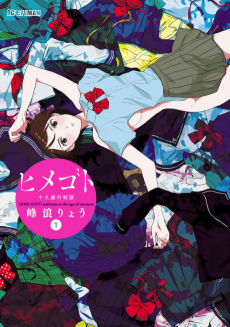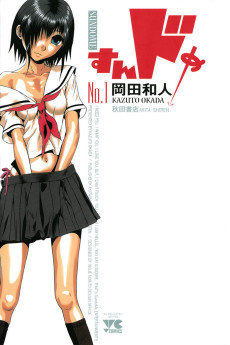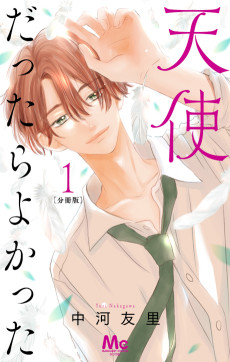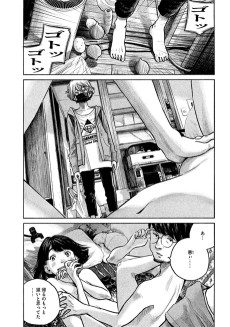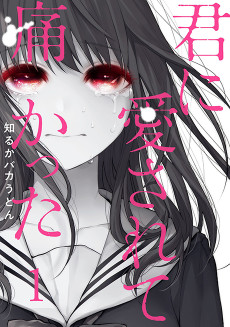OKAERI ALICE
STATUS
COMPLETE
VOLUMES
7
RELEASE
August 9, 2023
CHAPTERS
40
DESCRIPTION
The manga centers on three shy middle school students: Youhei, Kei, and Yui. All three have been together since kindergarten, and are childhood friends. As Youhei starts to become conscious that Kei is a girl, he witnesses a scene that he can't quite believe.
(Source: Anime News Network)
CAST
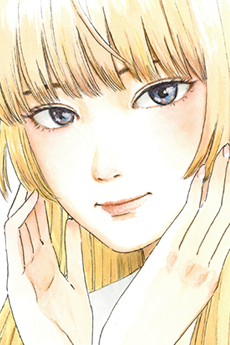
Kei Muroda

Yui Mitani

Youhei Kamekawa

Ren Ano
CHAPTERS
REVIEWS

Foresaw
90/100A niche but effective narrative on the struggle for love.Continue on AniListPreface Okaeri Alice is a very uncomfortable manga. A lot of focus is placed on the sexual and romantic aspects of adolescence which certainly is not for anyone. Nor is the narrative going to be relatable to everyone. I feel that these 2 facts are the primary reason why this manga is so criminally underrated, it is simply not for everyone. However, the people this manga was made for will certainly feel seen, as did I.
Art
I'll start this one off with arguably the least important element of Okaeri Alice, the art. Overall it certainly is not a masterpiece on the same tier as works such as Vagabond or Oyasumi PunPun, however, it does a good job conveying the human, cryptic emotions that the characters experience as well as the general scenery.


Story
Okaeri Alice is a story of 3 awkward middle schoolers and their struggle to navigate some specific and complex emotions. We have Kamehara Youhei, a boy whose actions seem to be entirely dictated by sexual desire (even moreso than the average adolescent male), and Muroda Kei, who is a generally mysterious character whose motives are almost as hard to figure out as their gender, and Mitani Yui, a girl who contradicts herself often, going from obsessing over an idolized version of somebody to dedicating her time to degrading and hurting them in an instant.As you can probably guess from those descriptions of the main cast, the manga is a shitshow. There is a ton of drama, manipulation, and depravity laced throughout the story, and I'll be the first to admit that it does get excessive at times. However, I believe there is more to this manga than just a wild drama featuring the trials and tribulations of youth. I believe that there is a deeper narrative, an attempt to capture a certain desire, a feeling, one that I know all too well.
__Narrative__ Okaeri Alice is a manga about the struggle for a pure, unconditional love. Not a love that involves romantics or sexual desire, but just love. The desire to be held, comforted, needed, and appreciated. The manga specifically depicts this feeling with some imagery of Muroda Kei and Kamehara Youhei as children, simply enjoying each other's company and playing in the water.
This on its own may not seem like all that special of a theme to the average person. I can't say because I can't read minds and this isn't by any means a popular manga. Whatever the case may be, this theme speaks to me, and I'm sure it will to others as well. I've dealt with depression for a long time, not about my future, my family, or my social life, but rather a lack of love. I don't mean a romantic love either as I've never had any interest in anyone like that, (although I have been plagued by lust though not as bad as our boy Kamehara) rather, I wanted someone who I could live my life with completely as normal, but us having each other's company fills every day with overwhelming joy. It's a feeling I have only experienced in my dreams, but it is one of pure bliss, far more satisfying than anything else I have ever experienced.
This is the feeling that Okaeri Alice tries to capture, and it does it well.
Conclusion
While it's clear to see that Okaeri Alice is not the best manga in terms of aesthetics, writing, or plot; the narrative and theme it tries to convey is a niche one that I seldom if ever see represented in media. In addition, not only is such a rare and specific theme represented, it is done extraordinarily well. So despite the obvious writing flaws and the general dumpster fire that is Okaeri Alice, I can't bring myself to feel anything but love for this manga that seems to see its audience and their deepest struggles so clearly.
Douzeries
70/100I applaud this manga for tackling sensitive themes but I partly disagree with the ideologyContinue on AniList
_(early chapters spoilers)_ Shuuzou Oshimi, notably known for making Aku no Hana & Chi no Wadachi, is a mangaka who often structures his works as horrror/mystery thrillers in order to portray toxic relationships as well as sexual and mental issues within its characters. I'm not familiar with many of his works, having only read a fraction of Chi no Wadachi and Okaeri Alice entierly but it's clear that the characters in the latter are a reflection of the author and a way to express his struggle with sexuality.



Okaeri Alice, or, Welcome Back Alice is the story of Youhei (first character) who's part of a love triangle with his best friend Kei (character in the center) and his crush Yui (last character). Kei suddenly leaves town and come back years later, but, with the local highschool female uniform on and a feminine appearance.

The plot revolves around Yohei and Yui trying to come in terms with their feelings for Kei despite Kei's gender having changed. We have Yui, who was in love with Kei 'the boy' and Yohei who is in love with Kei 'the girl'. This premise is original enough but what is even more interesting is that Kei hasn't actually become 'a girl'. They don't want to perceived as a boy but they also don't want to be perceived as a girl neither.
I know that's just called a non binary person but I don't want to restrain my analysis to real-life terms, even more so knowing the author never used that word despite being well aware of it.
Kei hasn't changed their gender, they just don't want to fall under any category. Society expect things from men and women. We're not to be who we truly are since who we are is determined by our gender. Thing is, a gender isn't our whole identity as a person. What if you don't act a way that is expected of your gender? Are you not a man/woman anymore? Do you not exist? Kei isn't concerned with their actual gender, but rather the implications forced upon genders, at least that's my interpretation of it.
So, what's my problem with the ideology behind the story? First, let's establish what the author was trying to convey.

_(afterwords from Shuuzou Oshimi)_ The author feels like 'being a man' is putting on a facade. He doesn't fit in naturally with others, even in his own intimacy. He wants to escape his body that causes others and himself to misunderstand him in order to find his true self. This is the core theme of the manga. Finding one's trueself beyond gender and societal roles. As long as I'm concerned, this is an inspiring and beautiful message but what's actually shown in the manga differs a little from that.


__Obscene content or actual story?__ It's really hard to draw the line between 'sexualization' and 'denunciation' in this manga. As the author said it himself, he 'tried to make his works catchy by stroking male desire'. Kei sexually assaults Youhei many times in the story, and while you can see that Youhei defends himself, implying that this is wrong in the narrative. One of the folowing panel is this:

To me, this indicates that Youhei only ran away not because he was like 'damn someone tried to SA me' but because he couldn't accept being turned on by a 'boy' kissing him. And these sort of scenes occur many times, this is good characterization for Youhei as it highlights his internal struggles but the narrative completely ignores how fucked up Kei's behaviour is towards Youhei. Since Kei is making him realize his true self, it's all accepted narratively wise. While the author justified Kei's behaviour in his afterwords, I still think of it as an issue.


The picture at the right is a panel that sexualizes a female character (who is 14 or something) and the picture at the left is an objectively non-sexual way of drawing naked characters. This is the dualism of the manga, in spite of the author's capacity to draw sexually explicit content in a way that is not meant to be consumed as porn, he purposefully sexualize disgusting and toxic behaviour. This is a problem because it makes it more similar to a hentai, content that doesn't concern itself with morals but only with sexual appeal, rather than the profound story it is trying to be. It's even more concerning because when a toxic behaviour is actually acknowledged in the narrative, it shows heavily which makes me think all the weird stuff that happened before weren't acknowledged as such.
While I understand that Kei's sexualization and the explicit scenes of the manga are essential to the story, you cannot convince me that it doesn't throw in some unecessary extreme depravity for the sake of it. It's hard to tell at what point it starts and at what point it stops. I'd say that this is a story that takes advantage of its ADULT status, both for triggering our dopamine with sexual content while also making a meta comment about sexuality and boys' relation with it. One not preventing the other while crushing the borders separating them.
Now that I elucidated my questioning on this work's morality, we can move on to my disagreement with the author's ideology.

'Finding one's true self beyond gender and societal roles.' was my initial interpretation of the manga's core message. After reading the story entirely, I realized that the author might have had a different vision from me on the subject.
The story establishes 'one's true self' as a period when we were young. At this time, gender didn't matter to us and we were the most authentical version of oursevles, untarnished by societal roles or such. Thinking back and forth about the story and its meaning I found sentences that could complete this interpretation.
"What? You want me all for yourself? Is that what the 'male' in you tells you?" Kei to Youhei

The author took the gender roles influence to an extent I disagree with. I'd associate being jealous of your partner cheating on you (/not wanting to be part of an 'open relationship'), having an erection and all the things mentioned with humans natural behaviour rather than gender roles endorsed by society. He's saying that the excessive exposure he had with adult content conditionned him into behaving in the same way than the men from the medium. Which is true, porn does indeed slowly ruin the minds of people consuming it, still our 'true selves' that weren't influenced by these, arent as pure as the story seems to try to make us think.
Based on the quote Kei said, men's societal roles caused Yohei to want his partner to be 'all for himself'. It also aligns with what the author says in the afterwords. However, as I said, such feelings are natural to humans. We're jealous by nature, gender roles only worsen these traits it but it does not cause it. Furthermore, the period of our true selves does not truly exist. Even as kids we were jealous and possessive. That isn't something that appeared when we learned about gender, it's intrisic to human nature.
The point of the story is for Kei and Youhei to return to this moment were they were just people that enjoyed eachother's company without any role, title or anything. But to me, this time does not exist and claiming otherwise is the same as saying we were born flawless then blaming it all on society and gender roles. In my opinion, gender roles typify human's nature, not the other way around. It's an effect, not a cause.

To conclude, I'm glad this manga exists, I desperately needed works that challenged my values and made me re-question things. While there's definitely a good case to be made about the story being wrtitten as a sort of thirst trap, it'd be foolish to ignore the philosophical drive of the author that caused him to make this manga. Plus, to relativize, the story woulnd't be half as captivating or intriguing if it weren't for its questionable narrative. This might be flawed or controversial but this is one of the only pieces of fiction that made me feel this way. I felt like I was falling in love along with the main character and idk, I guess it just felt good to experience a manga that plays with taboos. The storyboarding is incredibly well done and the drawings draw out untinkable emotions ouf the characters so efortlessly it's almost criminal. The immersion is intense, reading this is like playing a high pitch music on repeat. It feels dirty, fascinating, weird, captivating... Not everyone will like it that's for sure but for those who do it will definitely be one hell of a ride. And even as someone who doesn't completly agree with the message, reading the authors' notes while thinking back on the story was like having a conversation and that's what fiction is all about, really.
Complete afterword of the author:





satorublue
80/100Welcome Back, Alice: A thought-provoking and fascinating read on gender identityContinue on AniListMy Final Thoughts on Welcome Back, Alice: 
(this was initially going to be write-up I posted in the comments of my completed activity but apparently there's a word count so I'm posting it on here as a review instead) ──────── •✧• ──────── Welcome Back, Alice seriously surprised me, and it might honestly have to be one of the more fascinating manga I've read this year.
The story focuses on three childhood friends, Kei, Mitani and Youhei, as they navigate gender identity and gender expression in adolescence. The three friends separate when Kei moves to Hokkaido, but are all reunited when they begin high school. Kei returns to his hometown, adopting a gender expression different to what is typically associated with their assigned sex. Kei is now feminine-presenting but has explicitly stated that they neither want to be a girl nor a boy. This new change in Kei's gender expression sparks intrigue and discourse in the classroom. But, more importantly, it challenges Youhei and Mitani's ideas on gender identity. It also makes Youhei more aware of his own sexuality and gender identity.
Youhei and Kei's internal conflict with male sexuality and manhood are the key focus of 'Welcome Back, Alice'. The struggle between how Youhei is expected to act and exist based on his assigned sex (gender norms) vs. how he truly identifies and feels is in constant battle with each other. As pressures from societal expectations of manhood increase, Youhei becomes further and further detached from his body. It distorts his perception of his body and self. His relationship with the other characters, specifically Mitani, is guided by these difficult expectations leading to him hurting others and others hurting him. It's hard to see Youhei and Mitani spiral down a self-destructive path as they struggle to understand everything they feel. They feel trapped inside their bodies. Life as a teenager is already hard enough, with social influences from peers already playing an integral role in their lives, but to also factor in gender norms and sexuality can be overwhelming.
Kei also struggles with their gender identity despite thinking they've got it all figured out. In one chapter, Kei confesses they're just borrowing the form of a "sexy girl", but they are neither a girl nor a boy. Although Kei has accepted themselves as they are, they're still trying to navigate how best to physically express their truest self. At the end of the manga, Youhei tells Kei that he had a dream of Kei with short hair and they didn't appear as either gender. Kei expresses how they want to be like the 'dream Kei' and asks Youhei to cut their hair. It's a sweet moment shared between the two characters and honestly one of my favourite moments in the whole manga. Kei and Youhei are then able to fully accept themselves as people. It's when Youhei breaks away from gender norms and the restrictions it puts on him, that he's able to feel free. The way Oshimi chose to showcase this freedom is with panels of Youhei and Kei as kids, at a time when gender expectations and gender identity didn't have to matter.
I thought a bit about why Oshimi decided not to use the term 'agender' or 'non-binary' to describe what Kei was feeling. After some thought, I came to the understanding that the whole point of the story is that Kei, Youhei and later Ano, don't want to be defined by labels like 'girl' or 'boy'. They would much rather exist as people without being put into any gender category. Although agender or non-binary would be the expressed term to describe this feeling, attaching any label may do a disservice to what the characters have been wanting. This is a subjective interpretation though.
Now to talk about Mitani. Just as Youhei was a victim of societal expectations, Mitani was also affected by it too. I'm going to be honest, I don't like her at all because of what she does to Youhei but she's still an interesting character to think about. Youhei has had a crush on Mitani ever since they were kids but Mitani has always liked Kei. It wasn't until Kei's return that Mitani started to take a 'liking' to Youhei. It seems that Youhei's feelings are reciprocated but I don't think that was the case at all. We learn that Mitani was always jealous of how close Kei and Youhei were growing up, and now that Kei is feminine-presenting, her jealousy increases. This is where societal expectations come into play. As Kei continues to pursue Youhei sexually, Mitani's interest in Youhei increases. Mitani becomes jealous that Kei doesn't like her back and that their affections are towards Youhei, not her. She starts to use Youhei as a way to get revenge and to release her frustrations, but as much as it breaks Youhei, it breaks her too. As Youhei voices his eventual displeasure and unhappiness about sleeping with her, she instantly believes it's because she's failing as a woman especially as this issue doesn't arise with Kei. She researches all the ways she can please Youhei and none of it even makes her feel happy. She's also trapped by societal expectations of what she "should" be doing to make her boyfriend happy. It causes similar confusion and frustrations for Mitani as it does for Youhei. I wish Mitani got the same closure Youhei got in the end. It would've been interesting to see Mitani maybe talk about it more with Ano or Kei but with the manga's focus primarily on manhood, I can understand why that wasn't explored upon as much.
──────── •✧• ──────── Things I didn't like: As much as I enjoyed reading Welcome Back, Alice for the themes it presented, there were a few things I felt uncomfortable towards. There were a few times when the characters would engage in sexual acts without gaining consent first or consent wasn't explicitly stated. It was uncomfortable to read. It's SA and there was never a point where Kei's actions towards Youhei were pointed out as wrong or messed up. It's all written for narrative sake and a way to get Youhei to accept his true self. Although it's implied that it's wrong, with Youhei pushing Kei away, there are no consequences for Kei's actions. It's simply ignored. I couldn't help feeling frustrated with this, because with the story's narrative heavily focused on sex, sexuality, gender identity and expression, the constant SA shouldn't have been ignored. There comes a point in the story where Youhei feels trapped in his body, he hates himself, and it's said that the reason behind this is that he's struggling with his gender identity. But I like to add that if his boundaries are constantly being ignored/crossed, wouldn't a part of Youhei's discomfort around sex also be from SA and the constant pressure to have sex? It's not just Kei who does this to Youhei, Mitani also does this to Youhei and even Youhei in one chapter doesn't stop when Mitani withdraws her consent. Lines are made blurry with consent and boundaries. It's an issue because it is something that narratively drives the story forward to get Youhei to a place of acceptance.
Another thing that is hard to process is the sexualisation of minors. The characters are roughly 14 years old, and they're drawn explicitly at times. It is uncomfortable to read but it's also necessary to tell the story (?). It's hard in that sense to determine if it's ok to draw the characters explicitly if it's essential to tell the story. I do wish though that some panels were drawn less explicitly because again these characters are minors!
──────── •✧• ──────── Overall: I like that Oshimi was able to explore these themes in 'Welcome Back, Alice' as it may have been healing for him to write/illustrate as it probably was for many readers who are either transgender, non-binary or even cis-gender to read. That's why I find that Welcome Back, Alice can be an oddly comforting manga as it voices things that many people might be feeling. The story of 'Welcome Back, Alice' is heavily inspired by Oshimi's personal life and he details his journey in the afterword of each manga volume. I liked that he included his story in each volume as it added context to the manga. I did end up liking Welcome Back, Alice a way more than I did Happiness. However, there were times when I had to pause on particular chapters or pages just to process what I was reading because it was quite disturbing. It can be overwhelming at times especially as I chose to read it all in one sitting (it was just too interesting to put down!), but I'm very happy I ended up reading it. It's a thought-provoking and fascinating read. I know Welcome Back, Alice won't be for everyone though.
SIMILAR MANGAS YOU MAY LIKE
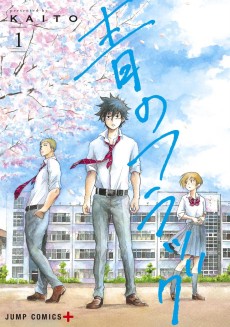 MANGA DramaAo no Flag
MANGA DramaAo no Flag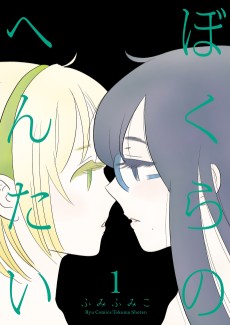 MANGA DramaBokura no Hentai
MANGA DramaBokura no Hentai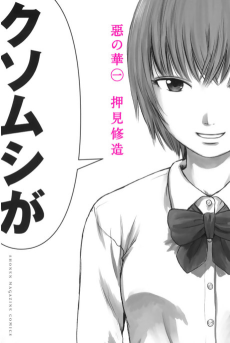 MANGA DramaAku no Hana
MANGA DramaAku no Hana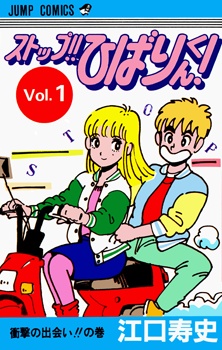 MANGA ComedyStop!! Hibari-kun!
MANGA ComedyStop!! Hibari-kun!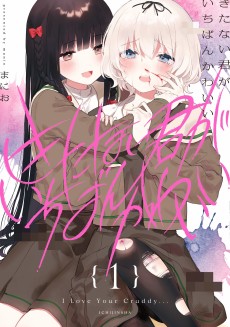 MANGA PsychologicalKitanai Kimi ga Ichiban Kawaii
MANGA PsychologicalKitanai Kimi ga Ichiban Kawaii
SCORE
- (3.45/5)
MORE INFO
Ended inAugust 9, 2023
Favorited by 436 Users

